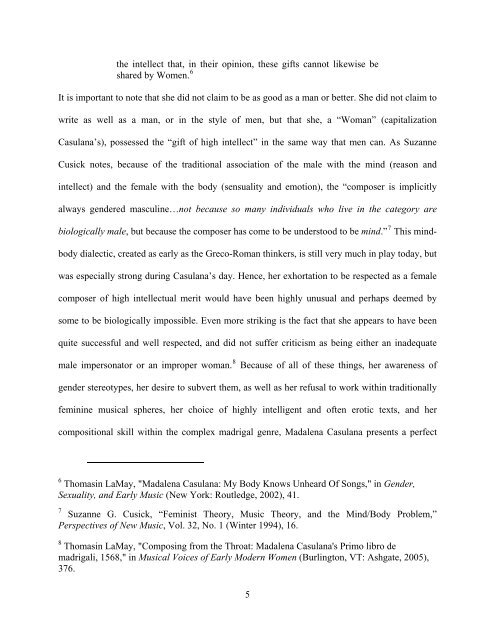Download - D-Scholarship@Pitt - University of Pittsburgh
Download - D-Scholarship@Pitt - University of Pittsburgh
Download - D-Scholarship@Pitt - University of Pittsburgh
Create successful ePaper yourself
Turn your PDF publications into a flip-book with our unique Google optimized e-Paper software.
the intellect that, in their opinion, these gifts cannot likewise be<br />
shared by Women. 6<br />
It is important to note that she did not claim to be as good as a man or better. She did not claim to<br />
write as well as a man, or in the style <strong>of</strong> men, but that she, a “Woman” (capitalization<br />
Casulana’s), possessed the “gift <strong>of</strong> high intellect” in the same way that men can. As Suzanne<br />
Cusick notes, because <strong>of</strong> the traditional association <strong>of</strong> the male with the mind (reason and<br />
intellect) and the female with the body (sensuality and emotion), the “composer is implicitly<br />
always gendered masculine…not because so many individuals who live in the category are<br />
biologically male, but because the composer has come to be understood to be mind.” 7 This mind-<br />
body dialectic, created as early as the Greco-Roman thinkers, is still very much in play today, but<br />
was especially strong during Casulana’s day. Hence, her exhortation to be respected as a female<br />
composer <strong>of</strong> high intellectual merit would have been highly unusual and perhaps deemed by<br />
some to be biologically impossible. Even more striking is the fact that she appears to have been<br />
quite successful and well respected, and did not suffer criticism as being either an inadequate<br />
male impersonator or an improper woman. 8 Because <strong>of</strong> all <strong>of</strong> these things, her awareness <strong>of</strong><br />
gender stereotypes, her desire to subvert them, as well as her refusal to work within traditionally<br />
feminine musical spheres, her choice <strong>of</strong> highly intelligent and <strong>of</strong>ten erotic texts, and her<br />
compositional skill within the complex madrigal genre, Madalena Casulana presents a perfect<br />
6 Thomasin LaMay, "Madalena Casulana: My Body Knows Unheard Of Songs," in Gender,<br />
Sexuality, and Early Music (New York: Routledge, 2002), 41.<br />
7 Suzanne G. Cusick, “Feminist Theory, Music Theory, and the Mind/Body Problem,”<br />
Perspectives <strong>of</strong> New Music, Vol. 32, No. 1 (Winter 1994), 16.<br />
8 Thomasin LaMay, "Composing from the Throat: Madalena Casulana's Primo libro de<br />
madrigali, 1568," in Musical Voices <strong>of</strong> Early Modern Women (Burlington, VT: Ashgate, 2005),<br />
376.<br />
5















